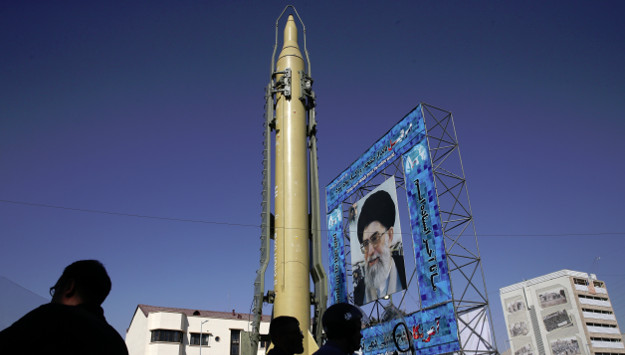French President Emmanuel Macron’s remarks on Friday about Iran’s destabilizing role in the Middle East and controversial missile program provoked angry reactions in Tehran. Ali Akbar Velyati, a top aide to Supreme Leader Ali Khamenei, said Tehran will defy international pressure and will not negotiate over its missile or other defense capabilities. “We do not seek others’ permission for our country’s defense programs so that they say whether or not we should have missiles, or say what the range of our missiles be,” emphasized Velayati, who is also a member of Iran’s Expediency Council. “What does this issue have to do with Mr. Macron? Who is he to interfere? If he wants France’s relations with Iran to improve, he should not interference in this issue,” he warned. “It is not in the interest of Mr. Macron and France to meddle in the Islamic Republic of Iran’s missile program, which is a sensitive issue for us. Such acts of interference will only diminish the French government’s credibility with the Islamic Republic of Iran.” Some Iranian media outlets also raised concern about Macron’s stance on Iran’s missile program and expressed the concern that Paris is siding with Washington against Tehran.
Comment: On Friday, Macron said the Islamic Republic should reduce its aggressive policies in the region and explain its strategy regarding its ballistic missile program. France also said last week that it wanted an “uncompromising” dialogue with Iran over the country’s ballistic missile activities separate from the 2015 nuclear agreement.
In August, Macron suggested that the Iran agreement could be “supplemented” to address some of the loopholes in the agreement. Macron’s proposal came after U.S. Secretary of State Rex Tillerson traveled to Europe to seek the support of Washington’s allies to toughen restrictions on Iran’s nuclear program and other non-nuclear concerns such as Tehran’s missile activities. One key U.S. demand from European allies is to pressure Tehran to extend the limits on Iran’s nuclear enrichment that expire in a decade.
But Iranian leaders have rejected Macron’s suggestion and ruled out negotiations over the country’s controversial ballistic missile tests and Iranian nuclear program after 2025. “Under no circumstances, the Islamic Republic of Iran will hold talks over the JCPOA,” Velayad had said in September. “This negotiation has taken place once and Iran held talks with the 5+1 countries for a long time and reached an agreement. No doubts from any countries regarding this accord is acceptable and we will not accept any such proposals.”
The chairman of Iranian Parliament's Committee on National Security and Foreign Policy, Alaeddin Boroujerdi, had echoed a similar view. “No negotiations to change the JCPOA will take place and America is obligated to implement this international document as one of its signatories,” he stressed.
Iran’s launch of several ballistic missiles this year has been one reason the Trump administration has accused Tehran of violating the “spirit” of the nuclear agreement, imposed new sanctions on Iran, and recently decertified the deal.
There appears to be a consensus among political and military leaders in Tehran to continue and further advance Iran’s missile technology at any cost. At the first press conference since winning reelection, President Hassan Rouhani said the Islamic Republic would continue its ballistic missile program despite Washington’s concerns. “American authorities should know that whenever we need to test a missile for technical reasons, we will carry it out. And we will not wait for them or their permission,” he said defiantly after U.S. and Saudi leaders criticized Tehran’s regional policies at the Riyadh summit. Iran’s Supreme Leader Ali Khamenei has also stressed that his country would further enhance its missile power “We have missiles and they are very precise. They can hit targets with precision from thousands of kilometers away. We will forcefully preserve and enhance this capability.”
While the nuclear agreement does not address Iran’s missile program, the subsequent U.N. Security Council Resolution 2231 “calls upon Iran not to undertake any activity related to ballistic missiles designed to be capable of delivering nuclear weapons, including launches using such ballistic missile technology.” Iranian leaders argue that the country’s missiles are not designed to carry nuclear warheads, but U.S. officials say some of the missiles Iran has tested after the 2015 nuclear deal have been "inherently capable of delivering nuclear weapons" and are "in defiance of" the U.N. resolution.



